Roque says”no hard lockdown,” economy still open but with restrictions from March 22 to April 4
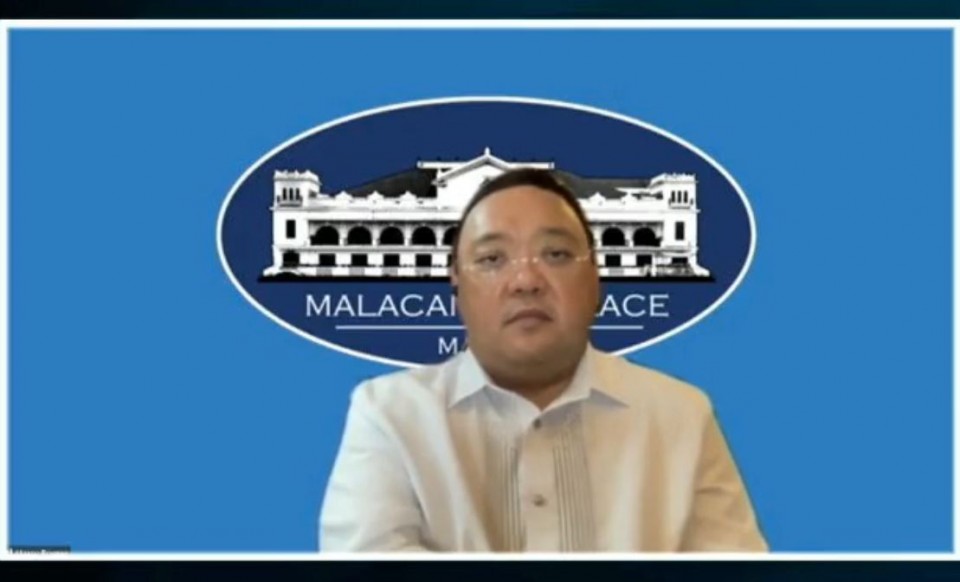
(Eagle News) — Metro Manila will remain under General Community Quarantine, along with the provinces of Bulacan, Cavite, Laguna, Rizal effective Monday, March 22 to April 4, to bring down the surge of COVID-19 cases in the country, Malacanang announced on Sunday.
Presidential Spokesperson Harry Roque said that this is not a hard lockdown as what has been circulating before the announcement.
“Wala po tayong hard lockdown. Fake news po yung mga sinasabing magkakaroon tayo ng circuit-breaker,” he said.
-GCQ bubble to prevent spread of infectious variants to other areas-
Roque also announced new restrictions that will try to prevent the spread of the new highly infectious variants in other parts of the country. These are contained in the Resolution No. 104 of the Inter-Agency Task Force on Emerging Infectious Diseases (IATF-EID) which held an emergency meeting on Saturday. The resolution has been approved by President Rodrigo Duterte.
There will be no travel in or out of the GCQ areas of Metro Manila, Bulacan, Cavite, Laguna and Rizal.
“Magkakaroon po tayo ng parang bubble dito po sa mga lugar pong ito,” he said.
Malacanang said that “only essential travel into and out of Bulacan, Cavite, Laguna, Rizal and NCR will be allowed.”
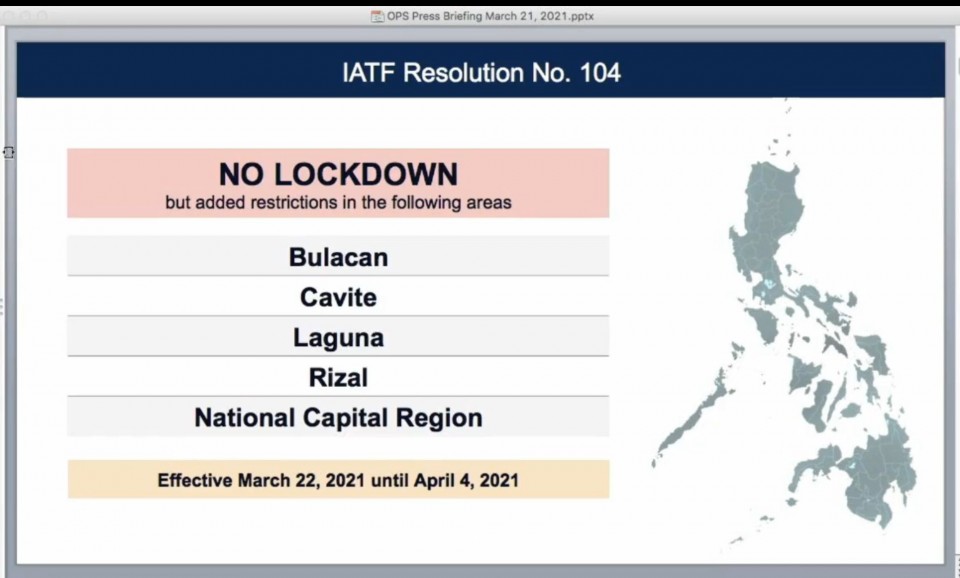
The Department of Health had earlier announced increasing number of cases with the highly infectious variants B1.1.7 (UK variant), B.1.351 (South African variant), and the P.1 (Brazilian variant) in the country, particularly in Metro Manila. Aside from these, cases with the new COVID-19 virus variant P.3 that was first detected in the country, are also increasing.
-Religious gatherings, mass gatherings prohibited until April 4-
All mass gatherings, including religious gatherings, are also prohibited from March 22 to April 4. Weddings, baptisms, and funeral services shall be limited to 10 persons,” Roque said.
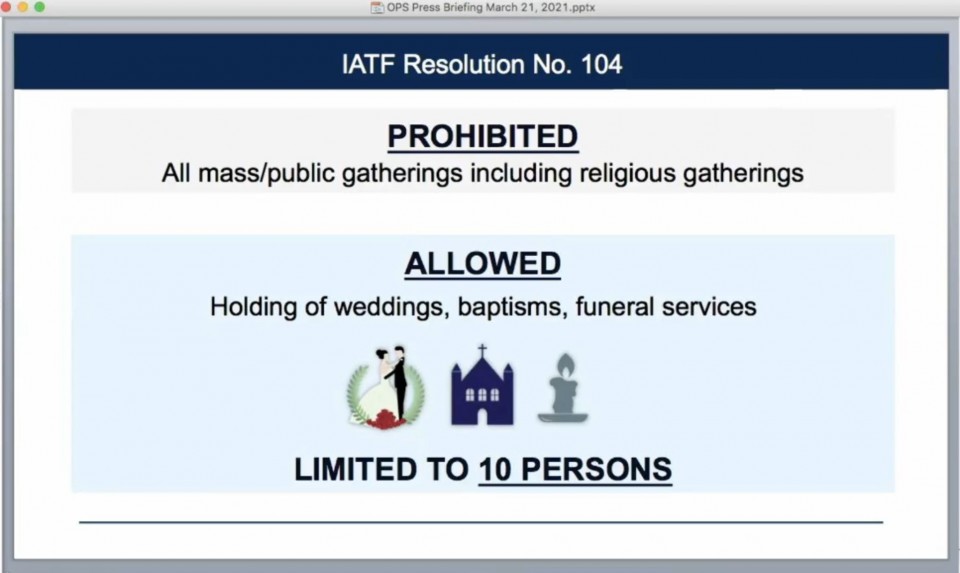
Public transportation will also retain its current capacity, but such capacities and protocols should be in accordance with the guidelines issued by the Department of Transportation. Biking and walking, however, are encouraged.
-Public transport guidelines-
Inside public transport, passengers should observe the following: wearing of face masks and face shield; not taking or making phone calls; no eating; and observance of physical distancing.
Public utility vehicles should also be well-ventilated and frequently disinfected.
No passengers with COVID-19 symptoms are to be allowed inside the public transportation, Roque said.
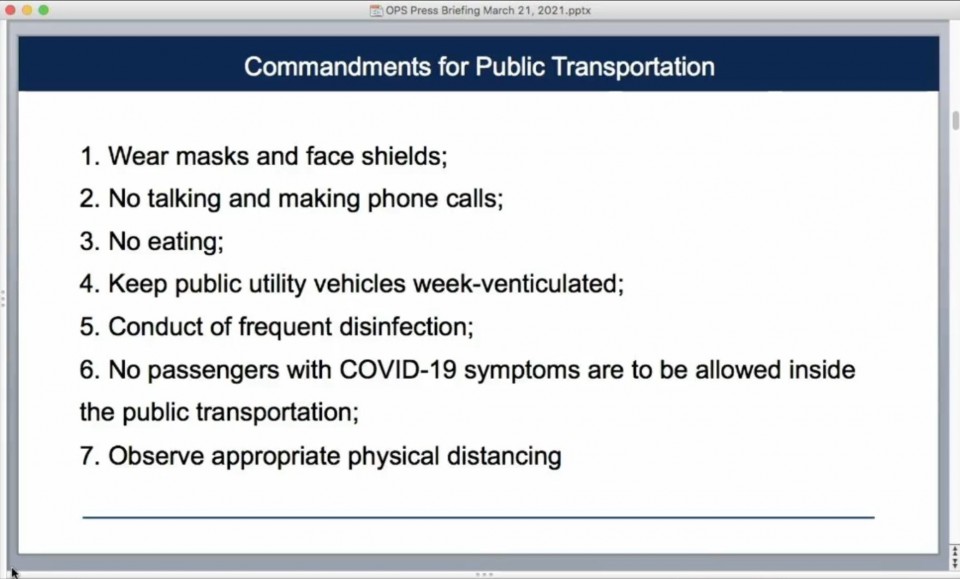
-Workplace restrictions-
Operational capacities of essential and non-essential services shall be maintained, but again subject to adherence to safety protocols and minimum public health standards, particularly in the prohibition of aggregation in communal areas such as pantries and canteens.
In the workplace, personal face-to-face meetings are discouraged, and group meals are not allowed. Working from home and virtual meetings are highly encouraged. Those with COVID-19 symptoms should not be allowed to work inside offices or establishments.
Workplaces should also strictly observe minimum public health standards.
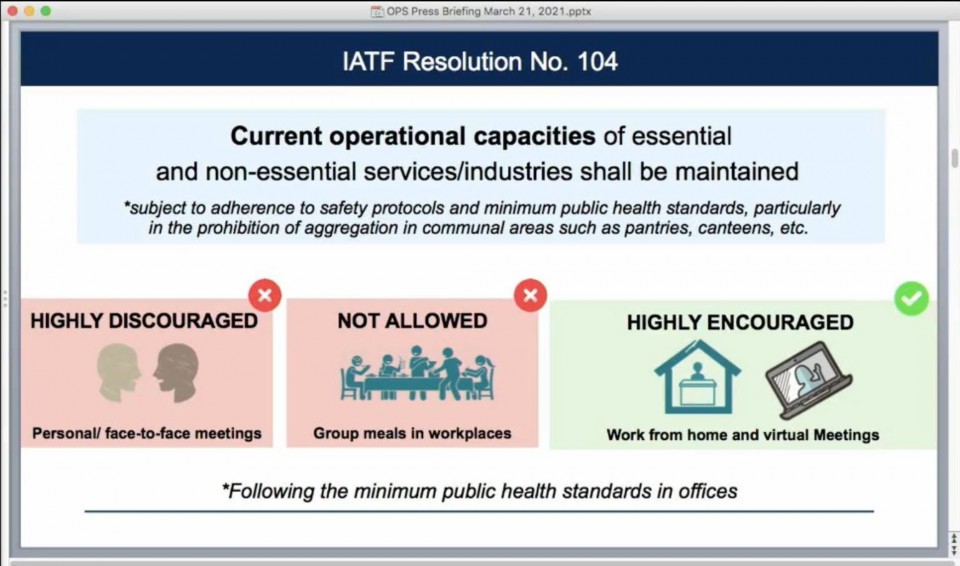
Roque also encouraged the private sector encouraged to adopt alternative working arrangement such as that applied in the Executive department such as “30 percent to 50 percent operational or on-site capacity, where applicable.”
“Ito po ay kung kakayanin po,” he said, noting that this might not be applicable in factories.
-Outdoor dining only-
As to restaurants or cafes, only outdoor dining is allowed in the next two weeks. Indoor dining is totally prohibited, while takeout and delivery is encouraged.
“Al fresco dining. Dapat nasa labas po,” Roque said. But there should be additional engineering and administrative controls put in place even in outdoor dining areas, such as placing of acrylic or similar dividers, limiting a table to two persons only, and the seating is in a “diagonal configuration” one seat apart.
Outdoor dine-in restaurants, cafes and personal care services are also limited to a maximum of 50 percent of the venue capacity.
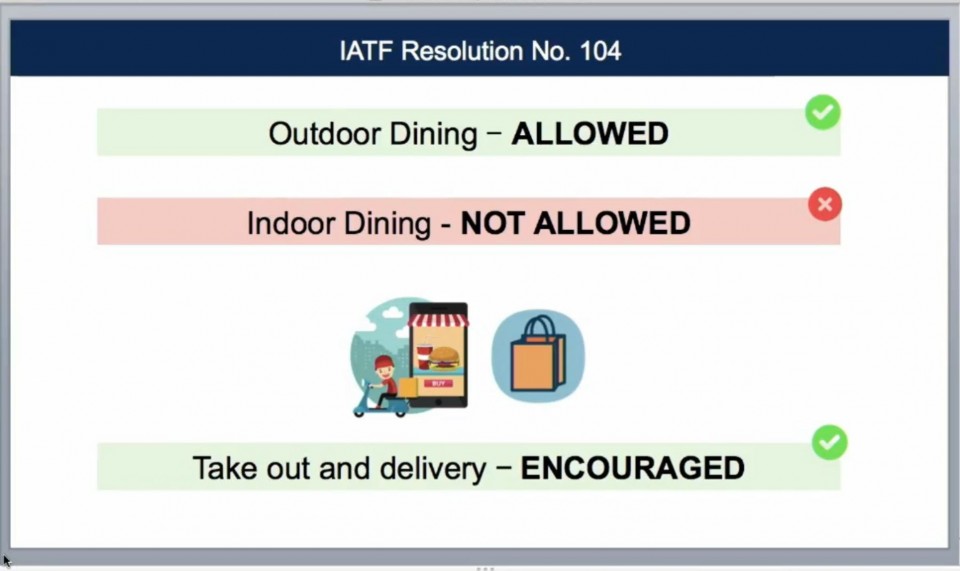
-Common curfew within GCQ bubble-
Common curfew hours of between 10 p.m. to 5 a.m. for the GCQ areas of Metro Manila, Bulacan, Cavite, Laguna and Rizal will be enforced. Only workers, cargo vehicles, and public transportation shall not be restricted by such a curfew.
-Wearing of face masks inside homes encouraged –
Meanwhile, all those below 18 years old, as well as those above 65 years old should remain at home. Those with immunodeficiency, comorbidity, or other health risks, and pregnant women should also remain at home.
Accepting visitors outside immediate family or household is also strongly discouraged. Wearing of masks even at home is also encouraged.
-Outdoor exercise for seniors, PWDs allowed-
Those above 65 years old, however, can go outdoors only for non-contact sports and outdoor exercise. Persons with disability are also allowed to go outdoors for exercise, as well as for their therapy, but they should present the necessary prescription and their PWD ID.
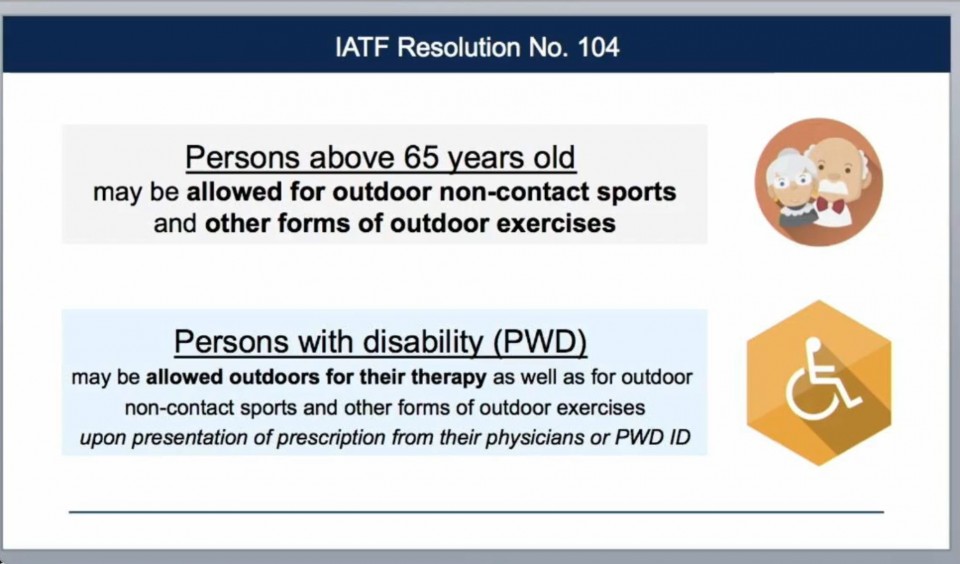
As had been announced before, there is a temporary suspension in the operations of driving schools, cinemas, video and game arcades, libraries, archives, museum, and cultural centers, tourist attractions and cockpits for the next two weeks.
-DILG to ensure isolation.quarantine protocols are enforced-
The Department of Interior and Local Government (DILG) is also directed to ensure that all local government units to enforce the following measures:
– ensure that the protocols for isolation/quarantine are completed before facilitating reintegration with the community;
– ensure and monitor minimum public health standards, and to distribute masks and face shields especially to the vulnerable sector; Barangay health emergency response teams (BHERT) are also tasked to monitor and ensure compliance of households.
LGUs should also actively find cases in the barangays with the highest cases using the Coordinated Operations to Defeat the Epidemic or CODE visits. They should also “increase and improve the facility based quarantine isolation through the Oplan Kalinga.
(Eagle News Service)








